You can read this exciting letter in its entirely on the Baha’i Reference Library here, and for ease of reference, we’ve also included the letter below:
9 November 2018
To the Baha’is of the World
Dearly loved Friends,
As the process of the disintegration of a lamentably defective world order gathers momentum in all parts of the planet, engendering hopelessness, confusion, hostility, and insecurity, the hearts of the friends everywhere must be assured, their eyes clear-sighted, their feet firm, as they work patiently and sacrificially to raise a new order in its stead. The guidance of Baha’u’llah is the foundation upon which you build. His instruction is clear: “This servant appealeth to every diligent and enterprising soul to exert his utmost endeavor and arise to rehabilitate the conditions in all regions and to quicken the dead with the living waters of wisdom and utterance, by virtue of the love he cherisheth for God, the One, the Peerless, the Almighty, the Beneficent.” His divine remedy has been prescribed: “God, the True One, beareth Me witness, and every atom in existence is moved to testify that such means as lead to the elevation, the advancement, the education, the protection and the regeneration of the peoples of the earth have been clearly set forth by Us and are revealed in the Holy Books and Tablets by the Pen of Glory.” And His assurance is engraved on every faithful heart: “The betterment of the world can be accomplished through pure and goodly deeds, through commendable and seemly conduct.”
During the ministries of Abdu’l-Baha and Shoghi Effendi, the first community of sufficient size that could begin to systematically apply Baha’u’llah’s teachings to unite material and spiritual progress was that of the believers in the Cradle of the Faith. The steady flow of guidance from the Holy Land enabled the Baha’is of Iran to make tremendous strides in but one or two generations and to contribute a distinctive share to the progress of their nation. A network of schools that provided moral and academic education, including for girls, flourished. Illiteracy was virtually eliminated in the Baha’i community. Philanthropic enterprises were created. Prejudices among ethnic and religious groups, aflame in the wider society, were extinguished within the community’s loving embrace. Villages became distinguished for their cleanliness, order, and progress. And believers from that land were instrumental in raising in another land the first Mashriqu’l-Adhkar with its dependencies designed to “afford relief to the suffering, sustenance to the poor, shelter to the wayfarer, solace to the bereaved, and education to the ignorant.” Over time, such efforts were augmented by scattered initiatives of other Baha’i communities in various parts of the world. However, as Shoghi Effendi remarked to one community, the number of believers was as yet too small to effect a notable change in the wider society, and for more than the first half century of the Formative Age the believers were encouraged to concentrate their energies on the propagation of the Faith, since this was work that only Baha’is could do—indeed their primary spiritual obligation—and it would prepare them for the time when they could address the problems of humanity more directly.
Thirty-five years ago, circumstances within and outside the community combined to create new possibilities for greater involvement in the life of society. The Faith had developed to the stage at which the processes of social and economic development needed to be incorporated into its regular pursuits, and in October 1983 we called upon the Baha’is of the world to enter this new field of endeavor. The Office of Social and Economic Development was established at the Baha’i World Centre to assist us in promoting and coordinating the activities of the friends worldwide. Baha’i activities for social and economic development, at whatever level of complexity, were at that time counted in the hundreds. Today they number in the tens of thousands, including hundreds of sustained projects such as schools and scores of development organizations. The broad range of current activities spans efforts from villages and neighborhoods to regions and nations, addressing an array of challenges, including education from preschool to university, literacy, health, the environment, support for refugees, advancement of women, empowerment of junior youth, elimination of racial prejudice, agriculture, local economies, and village development. The society-building power of Baha’u’llah’s Cause has begun to be more systematically expressed in the collective life of the friends as a result of the acceleration of the process of expansion and consolidation, especially in advanced clusters. Beyond this, of course, countless believers, through their professional and voluntary efforts, contribute their energies and insights to projects and organizations established for the common good.
Once again, then, we find that forces inside and outside the Faith have made possible a new stage in the work of social and economic development in the Baha’i world. Therefore, on this sacred occasion of the Festivals of the Twin Birthdays, we are pleased to announce that the Office of Social and Economic Development now effloresces into a new world-embracing institution established at the World Centre, the Baha’i International Development Organization. In addition, a Baha’i Development Fund will be inaugurated, from which the new organization will draw to assist both long-standing and emerging development efforts worldwide; it will be supported by the House of Justice, and individuals and institutions may contribute to it.
A five-member board of directors will be appointed which will function as a consultative body to promote and coordinate the efforts of the worldwide community in social and economic development. The directors will serve for a term of five years beginning on the Day of the Covenant. Operating at the spiritual and administrative centre of the Faith, the board will consult with the Universal House of Justice and the International Teaching Centre to ensure that the development work is coherent with the many endeavors of the Baha’i world. The new institution will begin by assuming the functions and mandate previously carried out by the Office of Social and Economic Development and then gradually grow in capacity to discharge them on an expanding scale and at higher levels of complexity. It will reinforce the efforts of Baha’i individuals, communities, and institutions worldwide to extend and consolidate the range of their activities. It will help to strengthen institutional capacity for social and economic development in national communities, including through the creation of new agencies and the emergence of advanced development organizations. It will promote, on an international scale, approaches to development and methodologies that have proven effective. It will keep abreast of findings in the development field and explore their application in consonance with spiritual principles with assistance from Baha’is with relevant training. It will form networks of resource persons and such institutional arrangements across continents as are necessary for carrying out its various lines of action. Above all, like the Office of Social and Economic Development before it, its primary purpose will be to facilitate learning about development by fostering and supporting action, reflection on action, study, consultation, the gathering and systematization of experience, conceptualization, and training—all carried out in the light of the Teachings of the Faith.
Upon the Arc on Mount Carmel that surrounds the resting places of members of the Holy Family, Shoghi Effendi anticipated both the raising of edifices and the establishment of international institutions—administrative, scientific, and social—that would flourish under the auspices of the Faith of Baha’u’llah. This new institution for social and economic development will grow and evolve over the decades and centuries ahead according to the needs of humanity and under the direction of the House of Justice until the material and spiritual civilization anticipated by Baha’u’llah is realized in this contingent world.
Ultimately, of course, the work of Baha’i social and economic development rests in the hands of the friends everywhere. To take full advantage of the opportunities emerging, one need look no further for encouragement and insight than to the perfect Exemplar of the Baha’i teachings. Consider His words: “We should continually be establishing new bases for human happiness and creating and promoting new instrumentalities toward this end. How excellent, how honorable is man if he arises to fulfill his responsibilities; how wretched and contemptible, if he shuts his eyes to the welfare of society and wastes his precious life in pursuing his own selfish interests and personal advantages. Supreme happiness is man’s, and he beholds the signs of God in the world and in the human soul, if he urges on the steed of high endeavor in the arena of civilization and justice.”
– The Universal House of Justice
Posted by
In her innermost heart, Sonjel is a stay-at-home parent and a bookworm with a maxed out library card but professionally she is a museologist with a background in English Literature. She currently lives on Prince Edward Island, an isle in the shape of a smile on the eastern Canadian coast. Sonjel is a writer who loves to listen to jazz when she's driving at night.








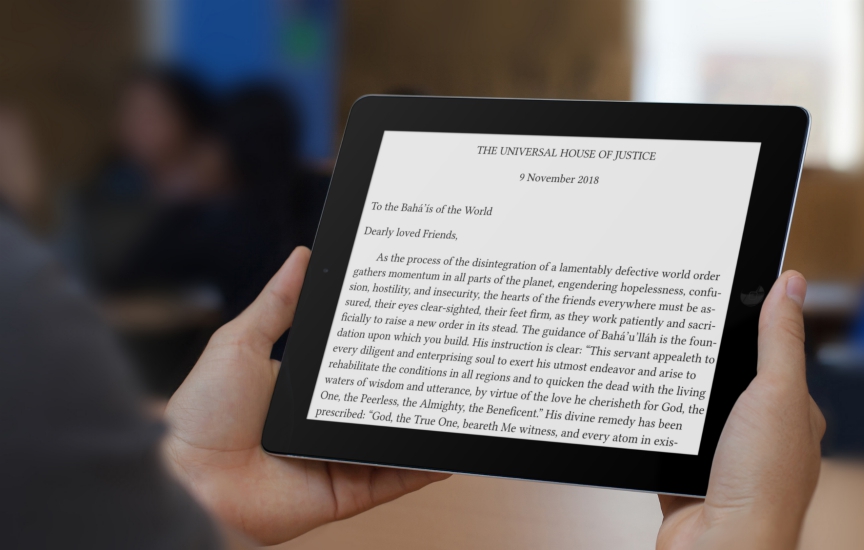


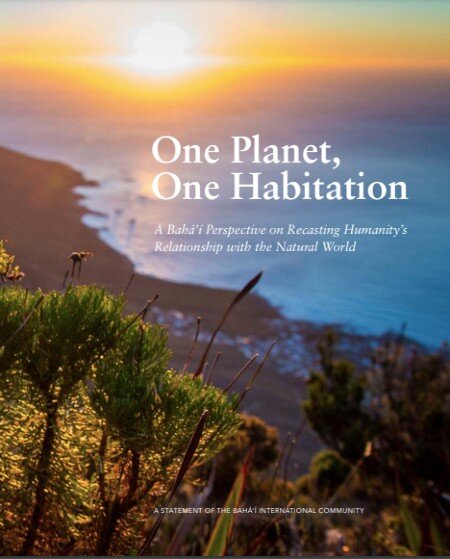
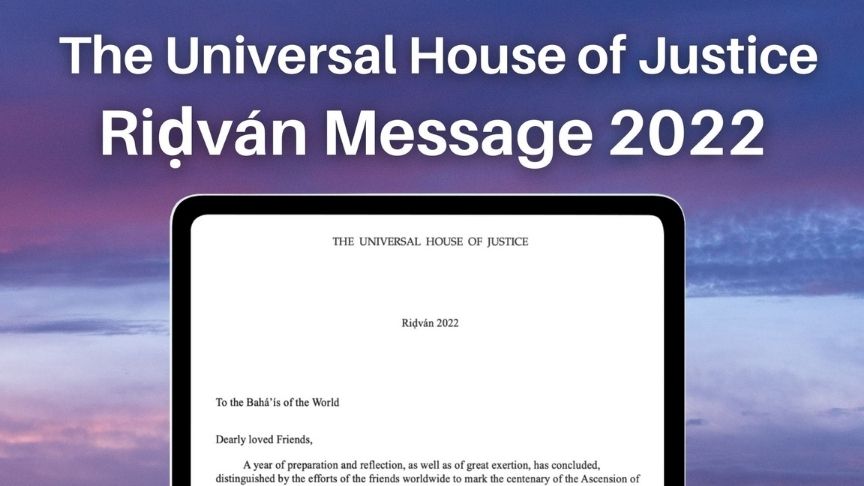

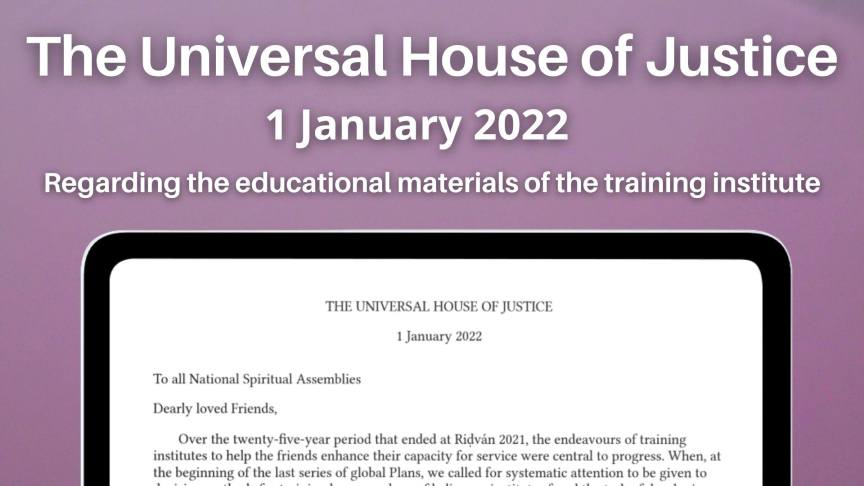
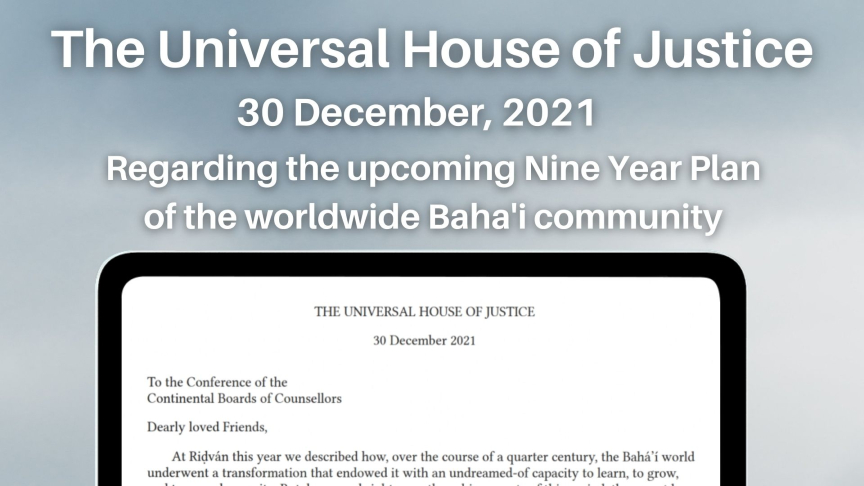
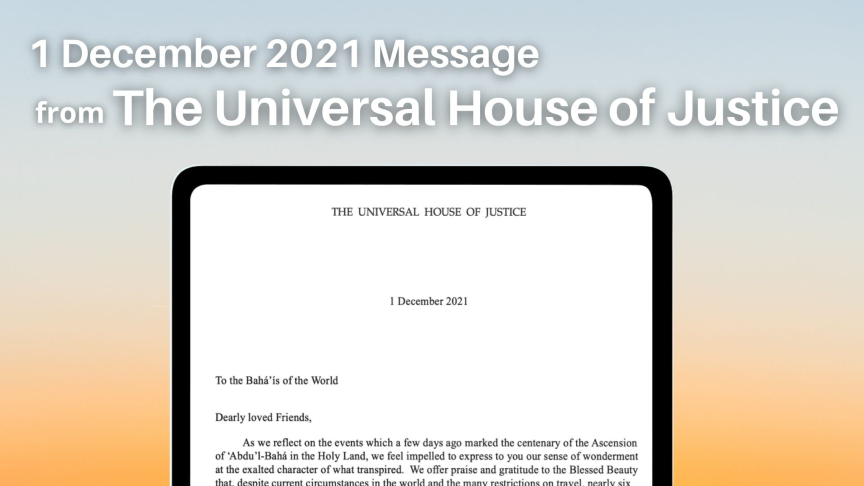




















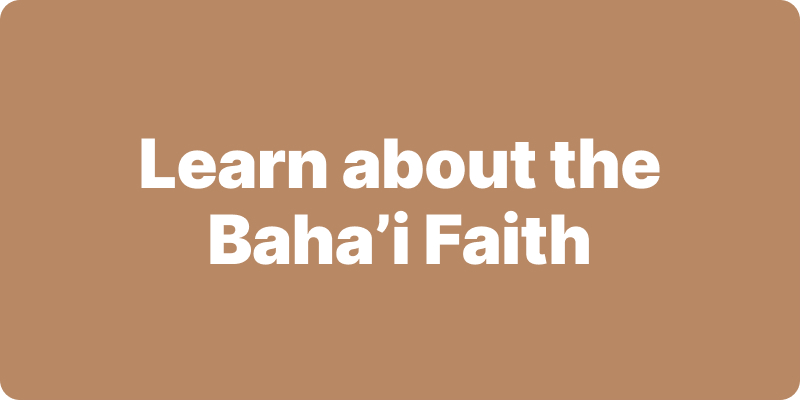


Thanks for sharing this information.
Peter Okello Hongo (November 11, 2018 at 2:03 PM)
You’re welcome Peter! 🙂
Naysan Naraqi (November 11, 2018 at 8:11 PM)
Please keep us informed of specific actions planned so I can help.
Darian Smith (November 11, 2018 at 3:34 PM)
Hi Darian,
That’s a great question! We are always happy to share news and developments from the Baha’i World Centre when we hear of it! Two great sources of news that we often quote are the Baha’i World News Service (https://news.bahai.org/) and the Baha’i International Community (https://www.bic.org/newsletter/subscriptions). You can subscribe to receive news alerts from both, if you haven’t already!
Sonjel Vreeland (November 11, 2018 at 11:11 PM)